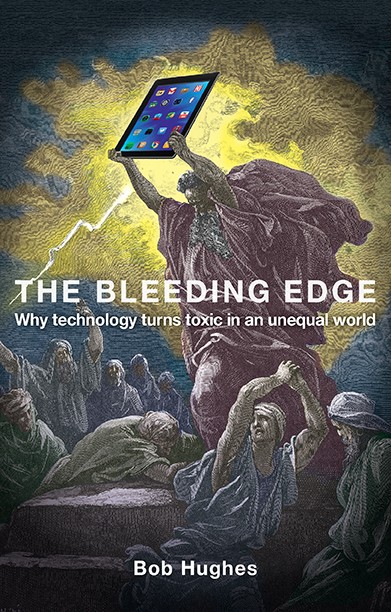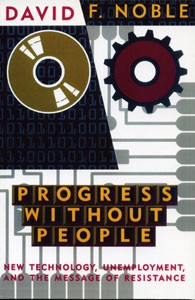
The Bleeding Edge
Why Technology Turns Toxic in an Unequal World
It’s hammered into us from birth that ‘all good things come at a price’. Today, that price looks apocalyptic, with wars, exploitation and environmental collapse in every part of the globe. Some suggest that the carnage is “a price worth paying” for technological progress. No pain, no gain.
But technology is precisely the business of minimising the costs and impacts of existence… and by whole orders of magnitude. By now, all human beings should be leading creative, leisure-filled lives in a pristine world of burgeoning diversity. So how did it go so wrong? In a word, inequality. In The Bleeding Edge, Bob Hughes argues that unequal societies are incapable of using new technologies well. Wherever elites exist, self-preservation decrees that they must take control of new technologies to protect and entrench their status, rather than satisfy people’s needs.
Hughes pursues the latest discoveries about the effects of social inequality on human health, into the field of human environmental impact, and traces today’s ecological crisis back to the rise of the world’s first elites, 5,000 years ago. He argues that new technologies have never emerged from elites or from the clash of competitive forces, but from largely voluntary, egalitarian collaborations of the kind that produced the world’s first working computers.
Finally, Hughes shows that an egalitarian world is not ‘pie in the sky' but our evolutionary homeland, the glue that holds societies together, and the “cradle of invention” from which all our best ideas emerge. The book concludes: ‘Let’s assume that the commitment to human equality that’s written into the Universal Declaration of Human Rights means exactly what it says, and take it from there.’
Praise
“Is new technology a blessing or curse? In this engaging and powerful book, Bob Hughes shows it can be either—and that the answer depends, above all, on whether society is plutocratic or egalitarian. A must-read for all who care about humankind’s future.”
– James K Boyce, University of Massachutts Amherst, US.
“Hughes’ book is much needed in helping us get beyond the glib national policies that seem to take both technology and inequality as givens. The Bleeding Edge deconstructs the causes of inequality and, while helping us understand that technology is not a panacea, it lets us truly understand for whom technologies are developed and sold.”
– Joan Greenbaum, Professor Emerita of Environmental Psychology, City University of New York, US.
“A fascinating study of how inequality inhibits technological innovations and how only an egalitarian society can truly sustain progress.”
– Hsiao-Hung Pai, author of Chinese Whispers, Scattered Sand, Invisible and Angry White People.
“Bob Hughes blows all the hype out of the water. He understands both the history and technology. In this wonderful book he explains how inequality turns humanity into a destructive force that then uses technologies to cause harm.”
– Danny Dorling, Professor of Geography at the University of Oxford
“The Bleeding Edge is truly the leading edge of books that challenge us to rethink the relationship between technology, capitalism and inequality. Rejecting both apocalyptic pessimism and techno-optimism, Hughes provides a compelling map to the future in which information technologies are harnessed for the common good. Powerfully argued and easy to read, this is one of those books that can help change the world.”
– Betsy Hartmann, Professor Emerita of Development Studies and senior policy analyst, Population and Development Program, Hampshire College
“Technology comes between us and our environment but, in this highly original book, Hughes shows how inequality comes between us and our technology.Inequality subverts technical progress, increases its environmental damage and prevents it from satisfying our real needs. A thesis we cannot afford to ignore.”
– Richard Wilkinson, Professor Emeritus of Social Epidermiology at Nottingham University and co-author of The Spirit Level
“Hughes nails inequality to the wall with precision and passion. His book dares us to stop begging for half-measures and instead demand our human birthright: full social and economic equality. He weaves together multiple strands to make the case against inequality, from economics through anthropology; from evolutionary theory through social epidemiology. Then once we has constructed his airtight logic, he colours it in with the emotional dimensions of life lived under oppressive hierarchy- or empowering egalitarianism. Hughes’ book dares us to stop begging for half-measures and instead demand our human birthright: full social and economic equality.”
– Deborah S. Rogers, President of Initiative for Equality, and affiliated to the Institute for Research in the Social Sciences at Stanford University
Contents
| Foreword | Danny Dorling |
| Introduction | |
| Chapter 1 | Technofatalism and the future – is a world without Foxconn even possible? |
| Chapter 2 | From water mills to iPhones: why technology and inequality do not mix |
| Chapter 3 | What inequality does to people |
| Chapter 4 | The environmental cost of human inequality |
| Chapter 5 | Ever greater impact, ever less benefit: high-tech capital’s mysterious lack of growth |
| Chapter 6 | The invisible foot: why inequality increases impact |
| Chapter 7 | Enclosure in the computer age: the magic of control |
| Chapter 8 | Sales effort: from the automobile to the microchip |
| Chapter 9 | Technoptimism hits the buffers |
| Chapter 10 | The data explosion: how the cloud became a juggernaut |
| Chapter 11 | ‘The least efficient machine humans have ever built’: how capitalism drove the computer down a dead end |
| Chapter 12 | Planning by whom and for what? The battle for control from the Soviet Union to Walmart |
| Chapter 13 | A socialist computer: Chile, 1970-1973 |
| Chapter 14 | Utopia or bust |



